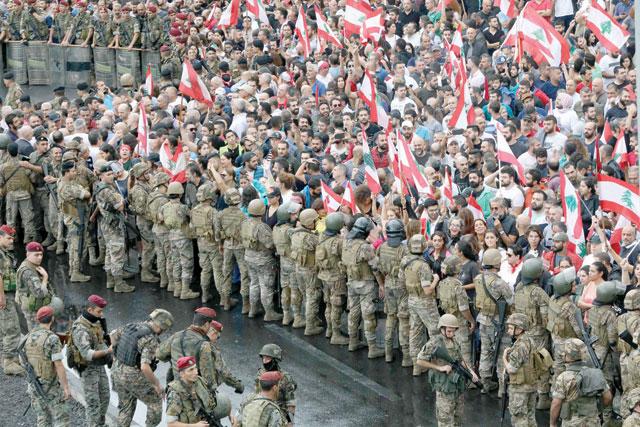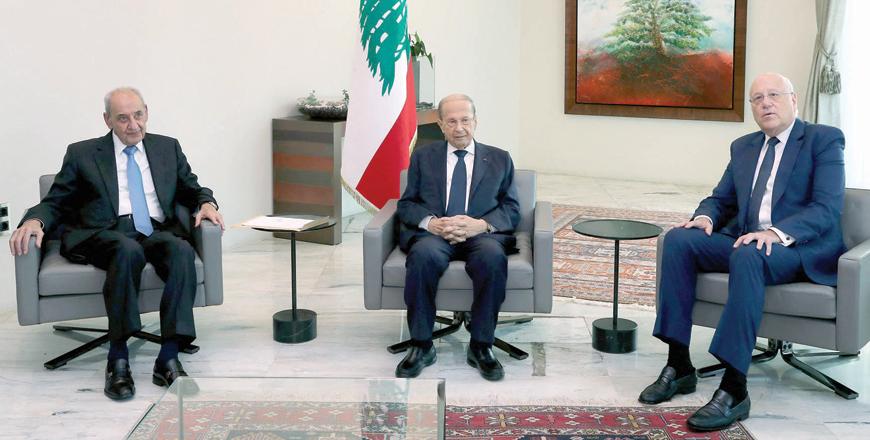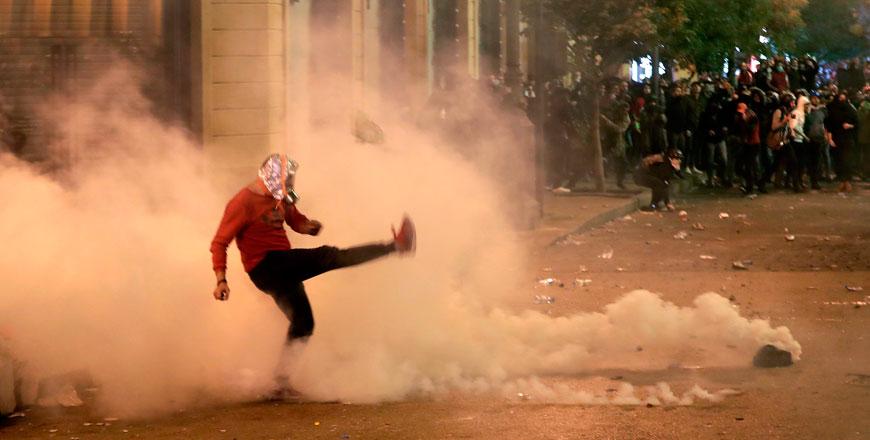You are here
Lebanese protesters face off against army as demos continue
By AFP - Oct 23,2019 - Last updated at Oct 23,2019

Anti-government protesters facing Lebanese army soldiers wave national flags in the area of Jal Al Dib on the northern outskirts of the Lebanese capital Beirut on Wednesday (AFP photo)
BEIRUT — A week of unprecedented Lebanese street protests against the political class showed few signs of abating Wednesday, with thousands again gathering across the country, braving rain and a heavy military deployment.
Protests sparked on October 17 by a proposed tax on calls made through WhatsApp and other messaging apps have morphed into an unprecedented cross-sectarian street mobilisation against the political class.
Prime Minister Saad Hariri has presented a series of reforms including cutting ministerial salaries, but the rallies have continued — crippling the capital Beirut and other major cities.
Protesters have vowed to stay on the streets until the entire government resigns.
On Wednesday, Hariri held a series of meetings with security and military leaders, stressing the need to "maintain security and stability and to open reads and secure the movement of citizens", according to the state-run National News Agency.
A senior military official confirmed they had orders to reopen main roads and the army deployed in increased numbers in a number of spots, including the main road north of Beirut.
Groups of protesters again gathered to block them, sparking fears of the kinds of clashes seen during the first two days of the demonstrations.
But protesters facing the soldiers began singing the national anthem and chanting “peaceful, peaceful”.
A video of one soldier seemingly in tears at the emotion of the scene was widely shared online.
“We saw the tears of soldiers standing in front of us,” Eli Sfeir, a 35-year-old demonstrator, said. “They are following orders and not happy about breaking up demos.”
The Lebanese army is one of the most universally supported institutions in an often divided country.
Fresh demonstrations began from lunchtime with thousands again taking over main squares in Beirut and other major cities, though numbers were lower than recent days, partly impacted by the arrival of a major storm front.
Banks, schools and universities remain closed.
Corruption charges
Separately Wednesday, state prosecutor charged former Prime Minister Najib Mikati over corruption allegations.
Mikati, 63, along with his brother, his son and a local Lebanese bank have been accused of “illicit enrichment” over allegations of wrongly receiving millions of dollars in subsidised housing loans.
The former prime minister, who was last in power in 2014, denied the allegations.
If convicted, he would be the first former Lebanese prime minister to be sentenced for graft.
While the allegations have been discussed for several years, the timing of the charges was seen by some as a nod to the demonstrators, who have expressed anger at the entire political class.
Mikati’s estimated wealth is $2.5 billion, making him among the 1,000 richest people in the world.
At one demonstration in Beirut, Michel Khairallah, a young waiter, said people would “block the country until victory”.
For him that meant a new government “without corrupt ministers,” made up of “young and competent people” able to finally move the country forward.
“They exist, they are just waiting for their turn,” he said.
Too little, too late?
More than a quarter of Lebanon’s population lives in poverty, according to the World Bank.
The country endured a devastating civil war that ended in 1990 and many of the political leaders are those that fought, often brutally, along religious lines.
The government is set up to balance power between multiple sects, which include different Christian groups, Sunni and Shiite Muslims, as well as the Druze.
But in reality it often entrenches power and influence along sectarian lines.
Hariri presented a vast economic reform plan Monday, including 50 per cent salary cuts for ministers, but it did little to assuage the demonstrators.
“Too little, too late?” the French-language newspaper L’Orient Le Jour wondered in a front page editorial on Wednesday.
Lebanese media discussed a range of options for further measures including a government reshuffle and early elections.
The protests, which Lebanese politicians have accepted were spontaneous, do not have a specific leader or organiser.
Lebanon’s economy has been sliding closer to the abyss in recent months, with public debt soaring past 150 per cent of GDP and ratings agencies grading Lebanese sovereign bonds as “junk”.
Fears of a default have compounded the worries of Lebanese citizens exasperated by the poor quality of public services, with residents often suffering daily electricity shortages and unclean water.
Related Articles
BEIRUT — Lebanese lawmakers on Monday tasked ex-premier and billionaire Najib Mikati with forming a government and ending one year of politi
BEIRUT — Lebanon has been paralysed by two months of protests demanding an overhaul of the entire political system. Here is a reca
BEIRUT — Lebanon's teetering government approved an economic rescue plan on Monday but the last-ditch move was met with deep distrust from a















